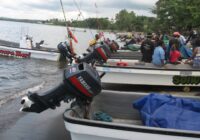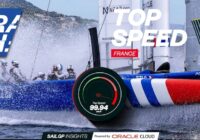A classic 32-foot Cayzer motor yacht built in 1976 is poised to return to the water as a one-of-a-kind gentleman’s cruiser, thanks to the vision of its owner, the talents of the restoration team at Tasmanian Shipwrights & Co. and WEST SYSTEM products.
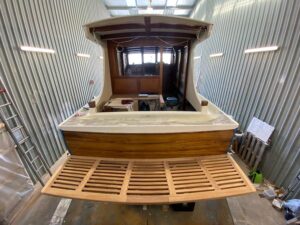
Originally called “Osprey”, the impeccably designed and built wooden boat was chosen for its “good bones”, says its owner, Tim Mundy, who spent over a year searching for the exact vessel to suit his criteria.
“It’s compact and manageable, we can stay on board for decent amount of time. There are good size cabins, heads, spacious living area with pilot door, and a nice big, covered cockpit.”
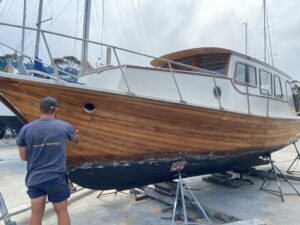
As Tim explains, “It took me ages to find the boat because I had a really specific set of criteria. Then, a couple of years ago, I made contact with Derwent Boat Sales at Kettering about Osprey.”
Tim and his family split their time between Melbourne and Bali. They have purchased 10 acres on the Huon River and plan to eventually relocate to live their rural idyll.
“I own a marketing and branding agency that operates worldwide, so I can work from anywhere,” he says. “I’ve built the business to a point where I don’t have to work day-to-day, and in the not too far future, hope to be living in Bali and Tasmania, enjoying our boat.”
The allure of Osprey lies in the quality of its timber and its enduring design.
“I love ‘resto-mod’ cars and the art of reviving things,” Tim states. “A Tasmanian log cabin is my ideal – and the boat is exactly like a floating log cabin. I was really struck by the craftsmanship and history, and wanted to bring it into the present day with the best quality, high-tech equipment on board.”
Tim’s vision is to “run away to the world’s end” with his wife and 2-year-old son. “I didn’t grow up around boats, so I really want to build this boat for him. There’s something magical about wooden boats – and enduring beauty that will last 100 years, long after we’ve all moved on. Wood is far more durable than we realise.”
He continues, “Old timber boats have character. I started out life as an artist, photography, painting, then marketing. I love storytelling. During my early career, I worked for Sotheby’s, managing their art gallery, and I was always fascinated with the provenance of a piece, its history and the layers of stories. In Osprey, I found a boat with a soul.”
Tasmanian Shipwrights & Co. were referred to Tim through the surveyor he contracted to inspect Osprey.
“Doug was very knowledgeable,” says Tim. “When I told him my plans, I said ‘find me somebody who wants to do the project of their dreams’.
“I’m willing to make a big financial commitment to build my dream boat, starting from scratch. I was looking for the technical excellence, experience and expertise, and the ability to embrace new things. Nathan O’Neill, Jonathan Minnebo and Matt Stevens are young guys going out on their own, and they jumped at the chance.”
Tim admits he’s struck the trifecta. “Finding the right boat, in the right location and the right team. They are really passionate, creative and open to new ideas. It’s a rare combination of a technical background, creative and open minds.”
The project is a complete restoration from the hull up, as Jonathan Minnebo (Jon) recounts.
“We stripped the hull and redesigned the cabin with a full internal refit. The project will take around 20 months, and is on track for a mid-year completion date. We’re aiming for sea trials over Easter, then final finishing touches and delivery by mid-year.”
The brief, according to Tim, was to “build a floating whiskey and cigar lounge”.
He continues, “Obviously there’s a lot more to the compact cruiser than these indulgences, but the craftsmanship required for these custom features is indicative of the entire refit.”
Jon adds, “The boat has many modern features subtly incorporated into the vintage fitout, including engines, nav technology on board and all the systems.”
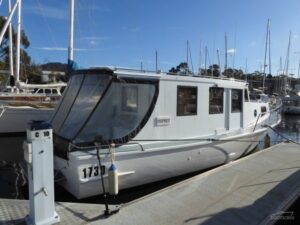
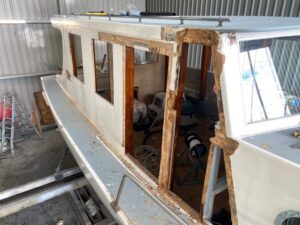
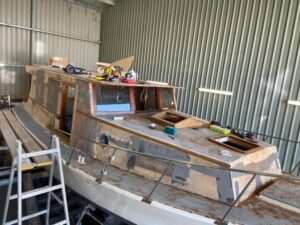
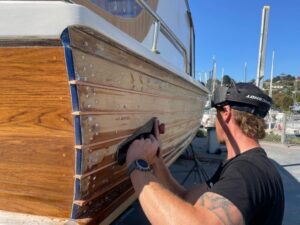
The vessel has been re-powered with a Volvo Penta D2-75 engine.
“Tim will be able to monitor all engine readouts via the Raymarine Axiom Pro, a 12-inch high performance hybrid touch multifunction display. He will also be able to monitor AIS/GPS charts, rear camera, water depth and music on the same screen, including many more functions available,” explains Jon.
“Being able to monitor multiple systems on the one screen has allowed us to build quite a minimal streamlined helm, in line with the original fitout brief.
For on board entertainment, the vessel has been equipped with Garmin’s Fusion MS-RA210 stereo, paired with an amplifier, four speakers and subwoofer, all of which will be installed out of sight. Tim will be able to control his music from the multifunction display, smart phone or even a Garmin watch.
As well as LED lighting throughout, she has also been fitted with underwater transom lights concealed beneath the swim platform. Provisions have also been made to fit courtesy lighting along all walkways and stairs throughout the vessel.
Then there’s the hot water service plumbed into the cooling system, delivering hot water to the transom shower, galley and the shower in the head.
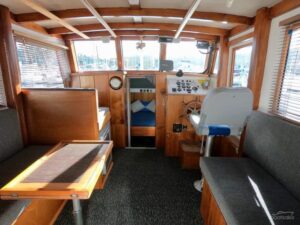
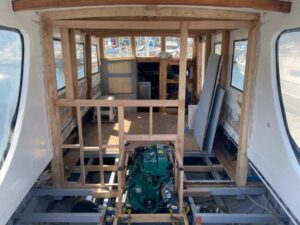
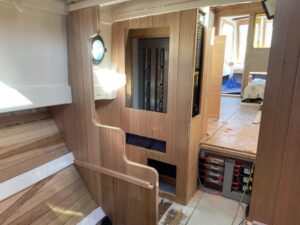
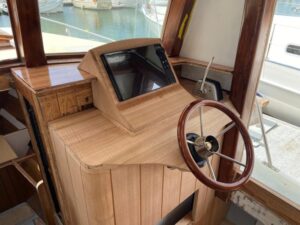
The main cabin will also have a smart TV inside the galley bulkhead, which will rise up when required and remain hidden when not in use.
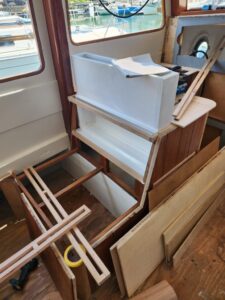
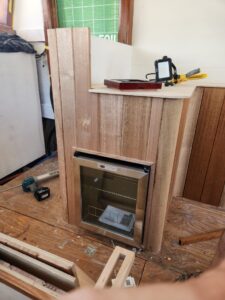
Other features include 240 watts of slimline solar panels within the wheelhouse roof, coupled with a Morningstar MPPT controller charging 480ah of house batteries which are isolated with Blue Sea Systems remote battery switches. And of course, the wine cooler under the bar.
The expert team at Tasmanian Shipwrights & Co relied on a number of products from ATL Composites, including several from WEST SYSTEM, as Jon reveals.
“The WEST SYSTEM products we used are the 105 epoxy resin coupled with 205 fast hardener for general glue ups/bonding and 206 slow for sheathing. For glue ups we also mix in 413 Microfibre. For fairing on the cabin sides and cabin tops prior to paint we used 410 Microlight.”
They also used the Epifanes marine coatings products on all exterior teak, timber work and trim, including the Epifanes PP Varnish Extra for rapid build-up coats to fill the grain, followed by four coats of Epifanes Polyurethane Clear Gloss for durability.
“The majority of timber work on the interior is Tasmanian Oak, finished with natural non-VOC coatings. This is complemented by Tasmanian Oak Fiddleback trim throughout the fitout, which is coated with a few coats of Epifanes PP Varnish Extra to fill the grain, then finished with Epifanes Polyurethane Clear Satin for a premium feel.”
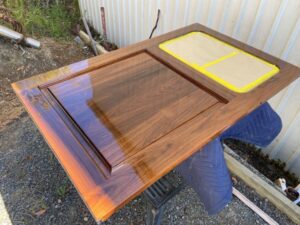
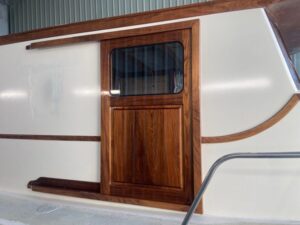
In addition to cruising the waters around Kettering, the Channel and Bruny Island, the revived motor yacht, which has been re-named “Floki” will likely make an appearance at the 2025 Australian Wooden Boat Festival in February.
“It would be great for people to see this beautiful example of an Australian icon brought back to life,” says Tim. “The son of the man who designed and built it is still around, and it would be just brilliant for him to see it back on the water as much-loved family boat.”
There’s a documentary in the pipeline about the refit and Tim intends to present a monthly podcast from the boat.
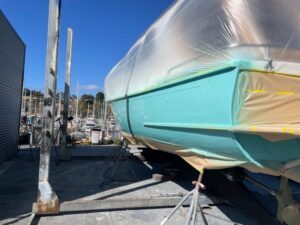
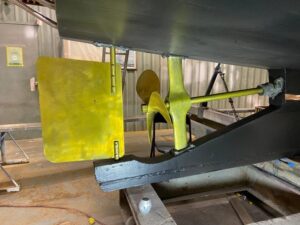
As for the significance of the name, “Floki”, made famous by Floki Vilgerðarson in the TV series “Vikings”, Tim says, “He was my favourite character and in history, Floki was a renowned boatbuilder, respected the Gods.
“He ran away from society to build boats. That resonates with me running away to Tassie. Floki also sailed further north than anyone had before. My place in Tassie is as far south as you can go.”





